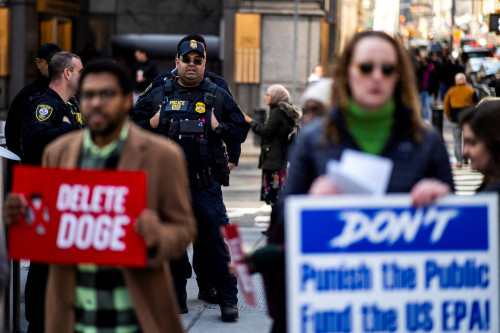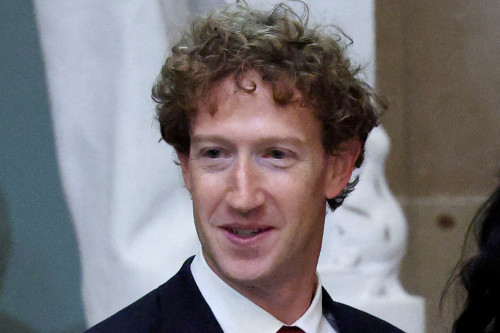By Tim Reid and Leah Douglas
WASHINGTON (Reuters) – Nick Gioia was terminated from the U.S. Department of Agriculture in February as part of President Donald Trump and tech mogul Elon Musk’s effort to slash the size and cost of the federal government.
Gioia was then reinstated and placed on paid leave after a court ruling. Now, after a second round of buyout offers were emailed in recent days to government workers in at least half a dozen federal agencies, the U.S. Army veteran decided to take it.
The roller coaster of terminations and reinstatements, as well as the fear and uncertainty suffered by Gioia and his colleagues, have taken a toll.
“For some of us, the time has come to step away before this experience completely erodes what remains of our well-being,” Gioia told Reuters.
Several other federal employees told Reuters they are taking this second buyout offer, saying that many civil servants are suffering from nervous exhaustion after three months of chaos and cuts driven by Musk’s Department of Government Efficiency.
It was unclear how many federal workers would take the buyout, and the White House and DOGE did not immediately respond to a request for comment.
“I didn’t want to take this one, but it’s just been such a confusing and unsettling few months. I have decided to accept it,” said one employee at the General Services Administration, which oversees government real estate, who requested anonymity out of fear of retribution.
“I’m emotionally exhausted. I basically hit an emotional brick wall last week,” the employee added.
The original “deferred resignation program” offer was sent to most of the 2.3 million-strong civilian federal workforce in late January. Over 75,000 government employees took it, part of the more than 200,000 workers pushed out of the federal government.
A second, similar offer was sent to a range of government workers in recent days, giving them the chance to go on leave with pay until September 30.
The deadlines to accept this second buyout offer vary. The Department of Agriculture’s deadline passed last week, others expire at midnight on Monday, while workers at the GSA have until Friday to decide whether to take it.
Some workers who have taken the offers, and government employee unions, have expressed concern that the resignation programs might not be legal, or that the funds are not even there to pay people through September because money for the buyout offers has not been appropriated by Congress.
Trump administration officials have said the buyout offers are binding and do not require the approval of Congress, which is controlled by Trump’s Republican Party.
Trump has said the federal bureaucracy is bloated, inefficient and needs to be streamlined. He also says he wants to reduce waste and fraud.
GREATER UNCERTAINTY
Bill Hoagland, a former Republican staffer and director of the Senate Budget Committee for more than 20 years, said the new buyout offer comes at a time of greater economic uncertainty triggered by Trump’s trade war with China and tariffs on other countries.
Employees leaving the government are entering a far tougher job market than just a few weeks ago, Hoagland said.
“During the first buyout, I don’t think we had anticipated the degree of geopolitical and economic difficulties brought about by the tariffs and the likelihood that has moved us into a potential recessionary situation,” Hoagland said.
Another GSA employee, speaking on the condition of anonymity, said many more colleagues had decided to take the latest buyout, despite fears of a worsening economy and job market.
“A lot more people are taking this one. People are basically exhausted, they are stressed out, and most think they’ll end up getting fired anyway if they don’t take it.”
Daniel Meyer, an employment attorney at Tully Rinckey in Washington, said three of his federal worker clients have taken the latest buyout.
He said his clients had been subjected to pressure tactics, including conduct and performance reviews.
“That puts pressure on the employees to leave,” Meyer said. “They looked at the deferred resignation program and found it more attractive than staying.”
(Reporting by Tim Reid and Leah Douglas in Washington; Editing by Scott Malone and Rod Nickel)







